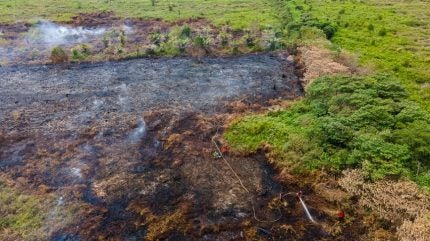
The EU is now proposing not to delay the implementation of its deforestation programme for “large and medium” companies beyond the end of this year.
Last month, the European Commission proposed another delay to the EU’s new deforestation rules coming into force, blaming IT problems.

Discover B2B Marketing That Performs
Combine business intelligence and editorial excellence to reach engaged professionals across 36 leading media platforms.
The Commission said the EU had put into place an IT system ahead of the deforestation rules going live to allow traders to register goods. However, the system had proved unable to handle the number of transactions, which had grown as the 30 December deadline approached.
The regulations, known as EUDR, were set to be implemented in December after already being pushed back.
The prospect of another delay sparked criticism from campaigners such as the WWF and some food manufacturers, including Nestlé and Ferrero.
The Commission said today (22 October) it is now proposing keeping the 30 December 2025 deadline in place for large and medium enterprises. However, they would still be given a six-month grace period “to ensure a gradual phase-in of the rules”.

US Tariffs are shifting - will you react or anticipate?
Don’t let policy changes catch you off guard. Stay proactive with real-time data and expert analysis.
By GlobalDataThe phasing period would allow those companies time for “checks and enforcement”, the Commission said in a statement in what it deems as “transitional periods to guarantee a smooth transition and [to] strengthen the IT system”.
For “micro and small enterprises”, the EUDR rules would still be implemented in December next year.
The Commission’s proposals will go before the European Parliament and the European Council for consideration, and “they would need to formally adopt the targeted amendment of the EU Deforestation Regulation before it can come into effect”, the Commission said.
It called on those two institutions to “swiftly adopt the proposal for an extended implementation period by the end of year 2025”.
The Commission said today it had been deploying the IT system in “close cooperation with stakeholders” since its launch in December 2024.
It added: “In the context of this dialogue, new projections on the number of expected operations and interactions between economic operators and the IT system have led to a substantial reassessment of the projected load on the IT system – being much higher than anticipated.
“The system must be capable of handling all due diligence statements for products covered by the law and submitted by all operators.”
The Commission continued: “The new entry into application dates, combined with the simplification of obligations for supply chain actors, aims to ensure that the IT system can sustain the level of expected loads.”
Following feedback from operators, the Commission is proposing simplifications for “operators and traders” such as retailers or “large” EU manufacturers that “commercialise” EUDR products.
“These companies are in the downstream part of the relevant value chains – the upstream operator will continue to exercise due diligence,” the Commission explained.
Similarly, for “micro and small primary operators from low-risk countries worldwide who sell their goods directly on the European market – these cover close to 100% of farmers and foresters in the EU”, it added.
It is now proposed downstream operators and traders should not have to submit due diligence statements of their commodity operations, the Commission said, noting only one entry would need to be submitted on the system at the point of EU entry for the “entire supply chain”.
The Commission explained that the “reporting obligations and the responsibility would be focused on the operators placing first the products on the market” and the amendment would replace the need for “regular submissions of due diligence statements”.
WWF said in a statement the move to simplify the EUDR “is a shameful surrender to political pressure”, adding that “weakening its requirements is both indefensible and dangerously irresponsible”.
Anke Schulmeister-Oldenhove, the senior forest policy officer at WWF’s European office, said: “Let’s be clear: proposing a partial delay and further changes is a deliberate choice, not an absolute necessity.
“It does not seem that the European Commission ever explored other options to fix any IT issues; it feels like the perfect scapegoat to water down the regulation.”
WWF called on the EU to uphold the original directive and aims of the EUDR but also pressed companies to “develop their due diligence systems to achieve fully traceable, transparent and deforestation-free supply chains”.
EUDR, first announced in 2021, was originally due to be enforced on 30 December 2024 but the Commission faced pressure from parts of the food industry to extend the deadline. Brussels agreed to a one-year delay last December.
In July, Cadbury owner Mondelez International had called for a further delay to the rules, arguing they had to be “workable” in practice.
However, a letter co-signed by rival chocolate makers Nestlé and Ferrero urged the Commission to ensure “the full preservation and swift, ambitious implementation” of EUDR.
Just Food has contacted those companies for comment today.
Nestlé said via a spokesperson: “We have taken note of the European Commission’s proposal to change the timelines and the content of the EU Deforestation-free Regulation (EUDR).
“Nestlé supports the objectives of the EUDR and has prepared intensively for compliance by the end of 2025.”
Meanwhile, Ferrero, also via a spokesperson, said the confectionery maker is “assessing the implications” of the EC proposal, noting cocoa and palm oil sourced by the company have “full traceability” in terms of EUDR-relevant products.
The Kinder chocolate brand owner added: “We welcome the inclusion of a grace period – an encouraging sign of collaboration that gives stakeholders the chance to pilot the implementation in real operational environments.
“Traceability and supplier due diligence have long been cornerstones of Ferrero’s sourcing model – well before the EUDR was formally adopted in 2023. Since then, we have further intensified our efforts and investments to align with the regulation’s requirements within the agreed legislative timeline.”





